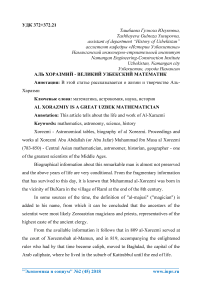Al Xorazmiy is a great Uzbek mathematician
Автор: Tashbayeva G.Yu.
Журнал: Экономика и социум @ekonomika-socium
Статья в выпуске: 2 (45), 2018 года.
Бесплатный доступ
This article tells about the life and work of Al-Хarazmi
Mathematics, astronomy, science, history
Короткий адрес: https://sciup.org/140236259
IDR: 140236259
Текст научной статьи Al Xorazmiy is a great Uzbek mathematician
Xorezmi - Astronomical tables, biography of al Xorezmi. Proceedings and works al Xorezmi Abu Abdallah (or Abu Jafar) Muhammad ibn Musa al Xorezmi (783-850) - Central Asian mathematician, astronomer, historian, geographer - one of the greatest scientists of the Middle Ages.
Biographical information about this remarkable man is almost not preserved and the above years of life are very conditional. From the fragmentary information that has survived to this day, it is known that Muhammad al-Xorezmi was born in the vicinity of BuXara in the village of Raml at the end of the 8th century.
In some sources of the time, the definition of "al-majusi" ("magician") is added to his name, from which it can be concluded that the ancestors of the scientist were most likely Zoroastrian magicians and priests, representatives of the highest caste of the ancient clergy.
From the available information it follows that in 809 al-Xorezmi served at the court of Xorezmshah al-Mamun, and in 819, accompanying the enlightened ruler who had by that time become caliph, moved to Baghdad, the capital of the
Arab caliphate, where he lived in the suburb of Kattrabbul until the end of life.
In Baghdad, the scientist, under the decree of the Caliph al-Mamun, takes over the reigns of the then-famous "House of Wisdom", which later will be called the "Academy of al-Mamun".
In fact, the "House of Wisdom" really was the Academy of Sciences. Many scientists from different regions of Central Asia and the Arab East worked there, they had at their disposal a rich library of ancient manuscripts, as well as a large, purpose-built observatory.
It was within the walls of this temple of science that the main were written.
It is known for sure that the scientist was the author of 20 scientific works, 9 of which took the form of full volumes: "The Book of the Indian Account", "A Brief Book on the Calculus of Algebra and Almukabala", "Astronomical Tables" (zidzh), "The Book of Building the Astrolabe" , "The book of the picture of the Earth", "The book about the actions with the help of the astrolabe", "The book about the solar clock", "The book of history", "The treatise on the definition of the era of Jews and their holidays."
However, only 7 books have survived to this day. Most often translations of his works into Latin, less often, commentaries on the scientific works of al-Biruni Arab scholars, and very few original copies surviving.
It is difficult to overestimate the significance of these works for the development of the medieval scientific thought. For example, his works on arithmetic, set out in the "Book of the Indian Account" led to grandiose consequences in science in general and ancient mathematics in particular.
And although the original text of the document is lost, a copy of the 12th century, translated into Latin, is preserved, from which it becomes clear that in this work the brilliant scientist first gave a systematic exposition of arithmetic, as a science based on the decimal system of calculus.
Translation of the manuscript begins with the words: "Dixit Algorizmi" -"Algorizmi said", however, very soon the author's name becomes a common name, and the word "Algorizm", first denotes arithmetic, and then any computation system subordinated to a particular rule. So in our life came the "algorithm", later imperceptibly moved from mathematics to cybernetics.
In the book "A Brief Book on Calculus of Algebra and Almukabala", the scientist presents six basic types of equations and suggests ways of solving them. Using his term "al-Jabr" in Latin transcription, European scientists began to define the science that he had created about the solution of square and linear equations, which in time was transformed into modern algebra.
And even the geographic works of al-Xorezmi are closely related to works on mathematics and astronomy. It is he who is considered the first author to write an essay on mathematical geography. For the first time in Arabic, scientists have been described by then known inhabited land. The work was accompanied by detailed maps with rivers, seas and oceans, the most important populated areas.
It is important that all the coordinates in the work were very accurate, because the writing of geographical work was preceded by a long and painstaking work to calculate the length of the earth's meridian.
Paying tribute to the genius of the scientist, the famous historian of science J. Sarton, so characterizes al-Xorezmi: "... the greatest mathematician of his time, and if you take into account all the circumstances, and one of the greatest scientists of all time."
Used sources:
Список литературы Al Xorazmiy is a great Uzbek mathematician
- И. A. Каримов «Высокая духовность -непобедимая сила». Т. «Маънавият», 2008
- И. А. Каримов «По пути духовного возрождения». Т., "Узбекистан ", 1998


